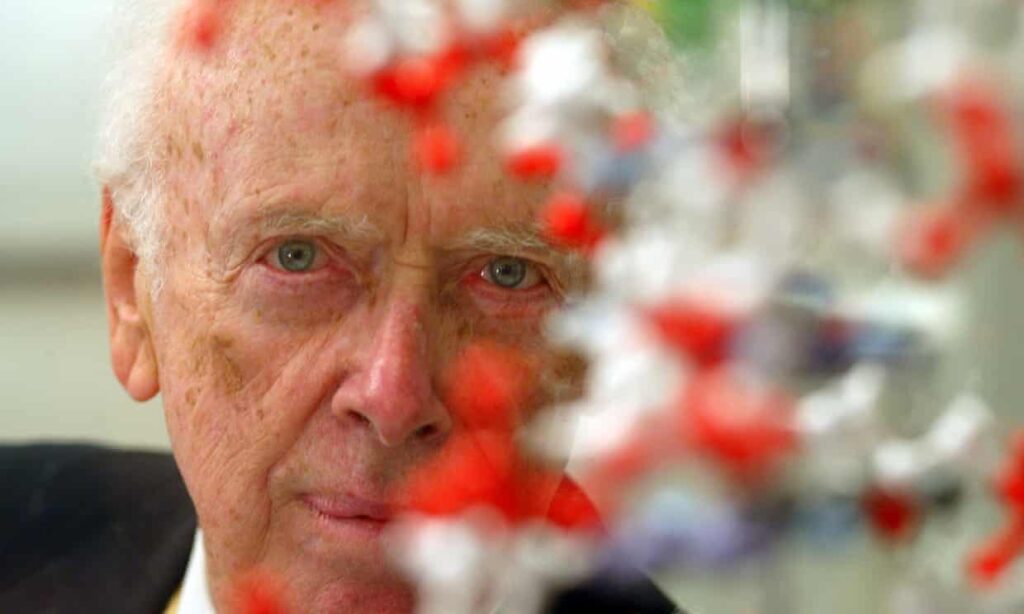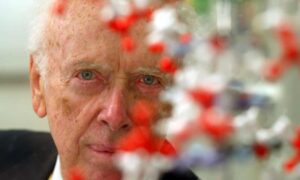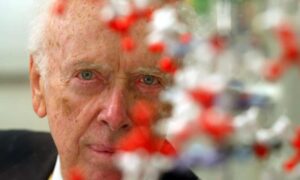
James Watson, the renowned American geneticist who co-discovered the structure of DNA, died on November 6, 2025, at the age of 97. His groundbreaking work in molecular biology, which unlocked the secrets of genetic inheritance, reshaped entire fields of science and medicine. Watson’s legacy is marked not only by his scientific achievements but also by his controversial statements that sparked significant backlash throughout his career.
Revolutionizing Genetics
In 1953, alongside British scientist Francis Crick at Cambridge University, Watson unveiled the double helix structure of DNA, a discovery that transformed our understanding of genetics. This finding demonstrated that DNA could carry genetic information, fundamentally altering the landscape of biology, medicine, and genetics. Their work catalyzed an industrial revolution in biological sciences, influencing areas such as evolutionary biology, medicine, and forensic science.
Watson vividly recounted the moment of their discovery in his 1968 memoir, The Double Helix, where he described Crick’s announcement in a local pub: “We have discovered the secret of life.” Their research revealed that DNA consists of two strands twisted together, with base pairs—adenine, thymine, guanine, and cytosine—forming the genetic code. This insight laid the groundwork for modern genetics and biochemistry.
A Complex Legacy
Despite his monumental contributions, Watson’s career was fraught with controversy. He often exhibited a ruthless ambition and a tendency to alienate his peers. His memoir, while celebrated for its vivid storytelling, sparked anger among fellow scientists for its perceived arrogance and criticism of their intellect. Watson’s comments on other researchers, including his assertion that “a goodly number of scientists are not only narrow-minded and dull but also just stupid,” highlighted his contentious relationships in the scientific community.
Watson’s partnership with Crick was a remarkable blend of contrasting personalities. While Watson was a young, competitive American eager to make his mark, Crick was an older, more measured Englishman who had transitioned from physics to biology. Their collaboration proved fruitful, leading to multiple significant publications and eventually earning them the Nobel Prize in Physiology or Medicine in 1962, alongside Rosalind Franklin‘s colleague, Maurice Wilkins.
Their victory, however, was overshadowed by the ethical implications surrounding their use of Franklin’s research without her acknowledgment during their discovery process. Franklin, who died in 1958, was a key figure in the discovery of DNA’s structure, and her contributions were not fully recognized until long after her death, stirring debate about gender bias in science.
Watson’s career continued to flourish as he took on various prestigious roles. He became a director at the Cold Spring Harbor Laboratory in New York, where he revitalized the institution and spearheaded major research initiatives. Under his leadership, the laboratory became a powerhouse of scientific research, contributing significantly to our understanding of cancer and molecular biology.
In the 1990s, Watson headed the ambitious Human Genome Project, which aimed to map the entire human genome. This monumental endeavor faced skepticism, yet it ultimately led to groundbreaking advancements in genetic research and paved the way for new fields such as genomics and bioinformatics.
Despite his professional achievements, Watson’s later years were marred by controversy due to his remarks regarding race and intelligence, which many viewed as racist. His comments, made in a 2007 interview, led to widespread condemnation and resulted in his resignation from various positions, including at Cold Spring Harbor. Even after apologizing for his comments, Watson faced ongoing criticism, including the revocation of his honorary titles in 2019 after repeating similar views in a documentary.
James Watson’s life story is one of brilliance intertwined with controversy. His contributions to science have left an indelible mark on the world, influencing countless fields and reshaping our understanding of life itself. He is survived by his wife, Elizabeth, their two sons, and a grandson. Watson’s legacy will continue to be examined and debated in both scientific and ethical contexts for years to come.






